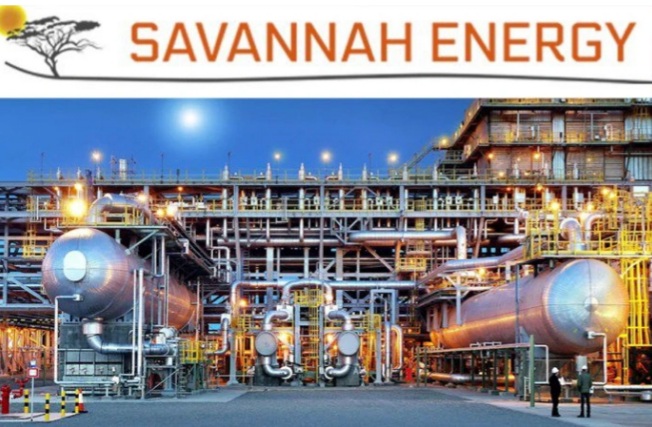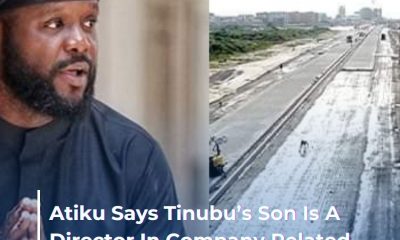Business
BUSTED: How Savannah Energy Deceived Investors over assets acquisition assets of ExxonMobil and Petronas – Stakeholders

The uproar generated by Savannah Energy Plc. planned acquisition of substantial assets of ExxonMobil and Petronas through the back door seems not to be abating yet.
According to industry sources, Savannah Energy had manipulated the handlers of the transaction at a time other Oil and Gas companies were also eyeing the deal.
The fallout of a deal that ought to have been responsibly managed by the company has become messier owing to the deliberate failure to disclose certain crucial developments to the market.
And worse still, the thorny issue has also unsettled stakeholders even as it has generated ripples in the media.
Stakeholders who are privy to the deal had expressed concern that Savannah Energy was not at the initial stage willing to disclose the hitch as required by market regulations.
This attitude, expectedly, irked opponents and industry analysts, who have continued to insist that the non-disclosure of the material information the company has kept to itself, is not only deliberate but grossly fraudulent.
Tracknews gathered that the government of Chad, through its state-owned oil company, Societé des Hydrocarbures du Tchad (SHT), had notified Petronas on January 18, of her decision to exercise her right of first refusal in the deal.
Incidentally, that was not to be as the gimmick, according to informed sources, was designed to favour Savannah Energy.
“So, SHT pretended to be in the process of acquiring control of the substantial shareholding in ExxonMobil and Petronas. Midway, it entered into discussion with Petronas concerning the adaptations to be made to the transfer agreement to reflect the substitution for Savannah Energy as the buyer,” one analyst, who refused his name in print, said.
A tweet sighted by TrackNews had called out the Energy Company insisting that an announcement indicating that “SHT has preempted Petronas transaction since January” should have been made.
”When is SAVE (Savannah Energy) updating the market on this material information?” the tweet inquired.
SHT was said to have initiated the process of taking the necessary steps to raise the financing for the operation. While this was going on, Savannah Energy had remained silent, in what industry analysts called a clearly unethical act, wilfully downplaying the potential impact the collapse of the deal might have on investors, who have made significant decisions based on the announcement made by Savannah Energy in December 2021.
Under article 12 of the association agreement, the members of the consortium had a right of first refusal for 30 days in the event of transfer by another member of its participation in the consortium, in order to carry out the concerned operation (which leads to the transfer of the stake concerned) in place of the initially planned buyer, under the same conditions as those agreed between the parties.
It would be recalled that after months of negotiations and site visits, the British firm and London Stock Exchange-listed company, announced the execution of share purchase agreements (SPAs) worth $626 million with ExxonMobil and Petronas to acquire their oil & gas assets in Cameroon and Chad in December 2021.
As a result of both acquisitions, Savannah Energy was to acquire a combined 75 percent controlling interest in the Doba Oil Project and 70 percent indirect controlling interest in the Chad-Cameroon oil export transportation system. The remaining interests would be reserved for the national oil companies of Chad and Cameroon.
The SHT Petroleum Chad Company will, also, according to the arrangement, hold the remaining 25 percent interest in the Doba oil project, while its affiliates will indirectly own the remaining stake in the transportation system. The Exxon transaction has a value of $360 million, while the deal with Petronas is worth approximately $266 million. However, both transactions are subject to shareholder approval.
Savannah Energy Chief Executive Officer (CEO), Andrew Knott, had said: “These assets have generated billions of dollars of critical tax revenues for their host countries and free cash flow to their owners since the onset of first oil production in 2003.
“Further, under our stewardship, we expect these assets in aggregate to generate positive free cash flow and fiscal revenues for Chad and Cameroon for a further 25+ years. For Savannah, these deals are expected to see our production levels and reserve base more than double.”
Soon after what analysts called the rigmarole, it was reported that the Africa‑focused British Company, was set to acquire ExxonMobil’s and Petronas’ entire upstream and midstream asset portfolios in Chad and Cameroon for a total of $626 million.
The company had reportedly signed share purchase agreements (SPA) with Exxon and Petronas (E&P) overseas ventures to acquire the assets. The move was to further expand Savannah Energy’s operations in Africa.
It had planned to fund the transactions through a combination of debt and equity/equity-linked financing.
Last year, the Doba Oil Project produced an average of 33,700 barrels per day (bbl/d) of oil. The Chad-Cameroon pipeline system transported a gross of 129,200bbl/d of oil in 2020. The deals in Chad and Cameroon, however, were aimed at further increasing Savannah Energy’s footprint in Africa.
Deal-making in the energy sector, according to Reuters, has gathered steam as oil and gas firms trim their portfolios to focus on more profitable assets and transition towards cleaner energy amid uncertainty over future demand for fossil fuels. Savannah, which currently operates only in Nigeria and Niger, said it intends to fund both transactions through a mixture of debt and equity.
The Exxon transaction is for $360 million and involves a 40 percent interest in the Doba Oil Project in southern Chad and about 40 percent indirect stake in the Chad-Cameroon export transportation system, Savannah said. The deal with Malaysia’s Petronas is worth $266 million, with a 35 percent stake buy in the Doba project and about 30 percent indirect holding in the Chad-Cameroon transportation network.
If completed on the currently proposed terms, the Projected Acquisition, sources say, would be classified as a reverse takeover transaction in accordance with the AIM Rule 14. Accordingly, the Company had requested that its ordinary shares be suspended from trading on AIM with immediate effect.
This, according to informed sources, will remain so pending publication of an AIM admission document setting out, inter alia, details of the Proposed Acquisition, or confirmation is provided that discussions around the Proposed Acquisition have been terminated.
Savannah Energy Plc. is an AIM market listed African-focused British independent energy company sustainably developing high-quality, high-potential energy projects in Nigeria and Niger, with a focus on delivering material long-term returns for stakeholders.
In Nigeria, the Company has controlling interests in the cash flow generative Uquo and Stubb Creek oil and gas fields, and the Accugas midstream business in South East Nigeria, which provides gas to over 10 percent of Nigeria’s available power generation capacity.
In Niger, it has interests in two large PSC areas located in the highly oil prolific Agadem Rift Basin of South East Niger, where the Company has made five oil discoveries and seismically identified a large exploration prospect inventory, consisting of 146 exploration targets to be considered for potential future drilling activity.
However, on June 15, in what industry analysts termed a “smart ugly move”, Savannah Energy Plc. announced the full year 2021 Annual Results. In the report, it posited the target completion of entry into Chad and Cameroon in Q3 2022 and further hydrocarbon acquisitions. The company said it would focus on the delivery of projects that matter in Africa, and was pleased to announce its 2021 Audited Accounts and Annual report.
The report specifically announced a proposed place to raise US$65.8 million of equity financing and secured up to US$432 million of debt financing for the proposed Chad and Cameroon Asset Acquisitions. The equity financing, according to the report, would be completed in January 2022.
While reviewing the “fantastic year for Savannah ”, Knott, had said: “We announced our potentially transformational acquisition of a large portfolio of upstream and midstream assets in Chad and Cameroon, which upon completion we now expect will more than double our corporate free cash flow.
“We established a Renewable Energy Division which, post period, has signed agreements for up to 750 MW of large scale greenfield solar and wind projects. We successfully renewed and amalgamated our Niger PSC areas, paving the way for the progression of our intended 35 MMstb R3 East development and a return to exploration activity in the licence areas.
“Our performance against key industry sustainability metrics relating to HSE performance, carbon intensity, senior management gender diversity, and local employee ratios remains industry-leading.”
He added: “Looking forward to the rest of 2022, I am confident in where we are as a business. We expect to deliver on our financial guidance. We expect to complete our entry to Chad and Cameroon during Q3 2022 and likely announce further hydrocarbon acquisitions.
“We expect to further grow our Renewable Energy Division, with several new large-scale Greenfield opportunities under review and negotiation. We expect to finalise the refinancing of our Nigerian debt and to announce the development and exploration plans for our assets in Niger.”
The question now is, if Savannah Energy’s attempt to close this deal to acquire the ExxonMobil and Petronas Assets in Cameroon and Chad has fallen through, why has Savannah Energy failed to announce the new situation to the market with the same gusto it announced the intended acquisitions?
Is Savannah Energy hiding anything? Or was it always a deliberate and calculated ploy to game the market?
-

 Gist3 days ago
Gist3 days agoMy Boss Used To ‘KNACK’ My Wife After Sending Me On A Mission, To The Extent She Got… – Ex-soldier
-

 News4 days ago
News4 days agoFake Reverend Sister Arrested With 38 Children
-

 News2 days ago
News2 days agoCooking Gas Price Has Fallen
-

 Politics3 days ago
Politics3 days agoRevealed: What Access Bank Said About Its Dealings With Yahaya Bello
-

 Gist4 days ago
Gist4 days agoDrama As Married Man Dies After Sleeping With Another Married Woman
-

 Politics1 day ago
Politics1 day agoAtiku Says Tinubu’s Son Is A Director In Company Related To Coastal Road Contract
-

 News2 days ago
News2 days agoRead How Auxiliary Was Whisked Away By Masked Security Agents as Family member Speaks
-

 Sports1 day ago
Sports1 day agoFinidi agrees deal with NFF, names three foreign assistants




